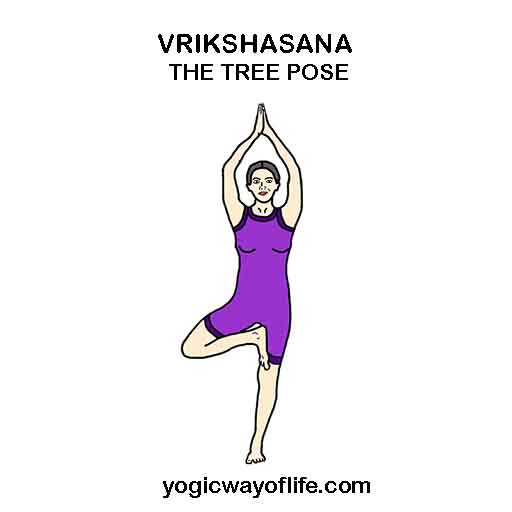Vrikshasana or the Tree Pose is an excellent yogic balancing pose. In sanskrit, Vriksha means a tree and Asana means a pose. In Vrikshasana, the weight of the entire body is shifted to one leg, strengthening that leg. The entire posture requires a good sense of balance and once mastered, gives a sense of confidence and steadiness.
How to do Vrikshasana (The Tree Pose)?
- Start in the standing position. Stand straight with arms on the side of the body.
- Now, take your hands and place on the hips. This can help you to balance better. Bend your right knee and place it on the inner side of the left thigh just above the left knee. The sole of the feet should touch the inner thigh.
- The left leg should remain straight. Try to maintain the balance of the body. The entire weight of the body rests on the left leg.
- Once you are steady, start raising the hands above the head. Bring the hands together, palms touching each other, in the prayer pose or Namaste The spine and chest should be held straight.
- Try to maintain your balance and look straight ahead. Breathe normally in this position.
- Try to maintain this for as long as you are comfortable.
- To release the pose, exhale slowly and simultaneously bring down the hands to the sides. Gently release the right leg and bring it to the floor.
- You can repeat the same procedure on the other side, by placing the left leg on the side of the right inner thigh.
Benefits of Vrikshasana (The Tree Pose)
- This asana is excellent for developing a good sense of balance.
- Vrikshasana strengthens the legs, arms and shoulders.
- It can help those suffering from sciatica.
- Vrikshasana calms the mind and makes the body steady and strong.
- It can strengthen the ligaments of the ankle and feet.
- Vrikshasana can be used to correct posture related problems.
Those suffering from vertigo and high blood pressure should avoid Vrikshasana.
In the initial stages, practitioners can experiment by keeping the hands wide apart over the head, instead of bring them together. This can give better balance for a beginner.
Also, after one has mastered Vrikshasana, one can try doing it with eyes closed after raising the hands. This would require a very good sense of balance and should only be attempted with caution.

